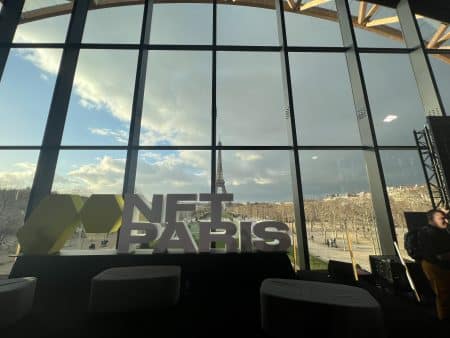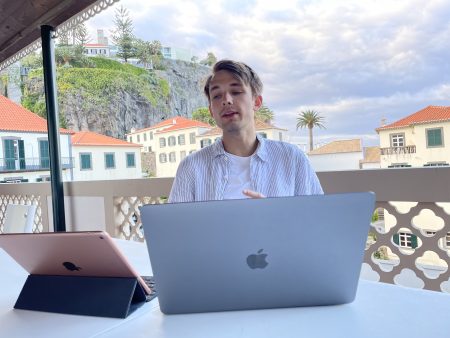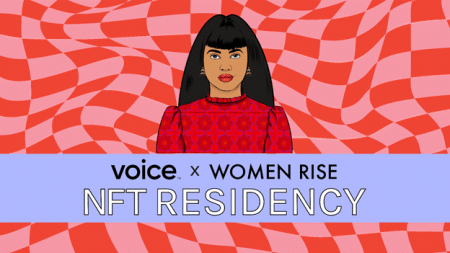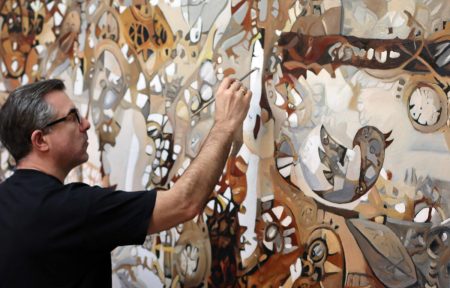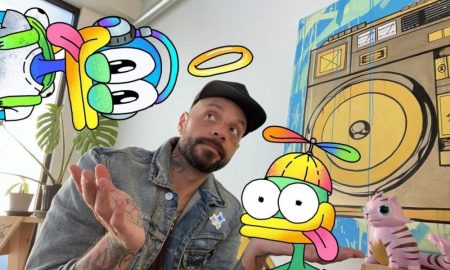NFT platform Voice is back with the latest edition of its NFT residency program. This time, in collaboration with the NFT collection Women Rise, the program will support female creators from underrepresented and marginalized communities. Together, Voice and Women Rise hopes to bridge the gender gap in NFTs and bring forth a much-needed change.
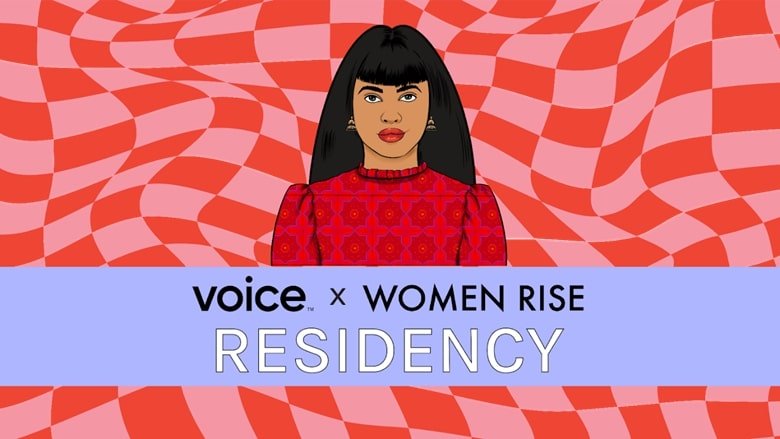
To be sure, women continue to be severely underrepresented in the art world. In fact, according to a report by The National Museum of Women in the Arts, the represented artists in the top 18 museums in the US are 87% male and 85% white. In the NFT space, in particular, things are no different. A report from November 2021 found that while women constitute 16% of the NFT art market, they make up only 5% of NFT sales.
Voice started the NFT residency program to support emerging artists
Originally, Voice started out as a tokenized, social media platform, said Eliza Fish, the firm’s Director of Partnerships and Creator Relations. However, last year, the company started looking into pivoting to NFTs. It was then that it realised that there were a few things it could “add to in the NFT space”.
The first was sustainability. Amid the growing environmental concerns of NFTs, Voice built a carbon-neutral NFT platform. The second, meanwhile, was to support emerging creators in the space.
“The Residency Program came out of our pivot last year to build an NFT platform for emerging creators,” Fish told NFTevening.
“The program was designed to bring together the art world and Web3 visionaries with emerging artists around the world. Some of them had done NFT collections before, while some of them had barely heard of an NFT. And so we tailored the program so that it was a custom experience for each person based on their needs.”*
Ultimately, Voice hoped to engage creators—both NFT veterans and emerging artists—from all over the globe and make the creation process easy. Besides, the program proved an opportunity for Voice to learn “what artists needed, what they were looking for, and what they were interested in.”
The platform launched the first NFT residency in September 2021. The program was helmed by six acclaimed creators as curators—Kimberly Drew, Azu Nwagbogu, Myriam Ben Salah, Alexander Gilkes, Chad Knight, and Misan Harriman. Each curator worked with three artists. Eventually, each artist created collaborative NFT pieces around the theme “Raise Our Voice.”
“We had six curators and we were looking to engage curators who had a lot of different backgrounds, disciplines, and expertise,” Fish explained. “We were looking to bring in as many perspectives as possible.”
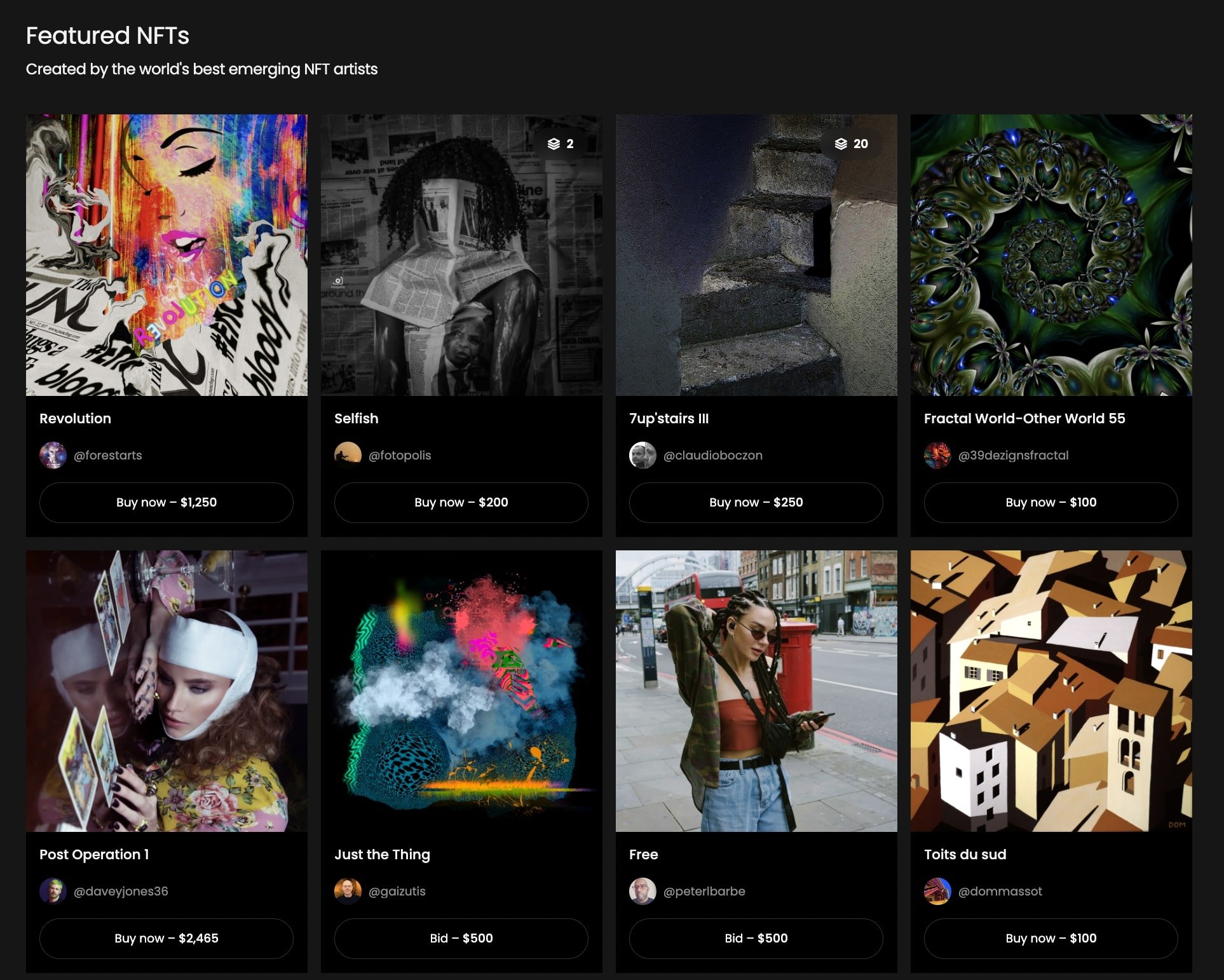
A successful first season gave rise to others
The first season, according to Fish, was “incredibly” successful. And the major takeaway for Voice was to curate more such programs, catering to specific communities.
In March, Voice announced the second season of the NFT Residency to support creators from underrepresented and marginalized communities. Then too, the program boasted a stellar line-up of curators—Ayanfe Olarinde, Shan Vincent de Paul, and Autumn Breon.
In the upcoming season of the NFT residency, Voice wanted to “intentionally create space for women to drop NFT collections and to share their stories.”
To bring this vision to fruition, Voice decided to partner with Women Rise and its founder, Maliha Abidi. A Pakistani-American visual artist and author, Abidi has been advocating for social justice, including women’s rights, gender equality, and girls’ education for nearly a decade. Already, Abidi had worked as a curator for Voice’s exhibition during the first NFT NYC event.
Besides, Abidi’s 10K NFT collection, Women Rise features women from across the globe. The collection celebrates “activists, artists, scientists, coders and many others rising to make the world a better place!” The project in itself has been supporting worldwide gender equality causes. In fact, it has donated 2.5% of primary sales to the Malala Fund. Separately, it donated 7.5% of the funds to international organisations championing social justice.
“The voice residency program and the kind of platform that Voice is, I feel it’s so incredible and perfect,” Abidi told NFTevening. “This residency is also so true to the core values of Voice as well. It will provide more and more opportunities for women of colour and creators of colour. I’m really honoured and really grateful to be a part of it, and for Women Rise to be a part of it.”
“In women empowerment, actions speak louder than words”
“Sometimes the word women empowerment loses what it’s trying to say because it has just become such a buzzword,” Abidi explained. “We [Women Rise] try to use sentences or actions that would advocate for women empowerment, but without actually using the words “women empowerment”. Because your actions speak louder than words.”
“And that’s exactly what the Voice residency program is,” she added. “It is focused on not just amplifying female artists, but also giving them grants that will allow them to advance their careers, and giving them a platform that will allow them and their work to be seen.”
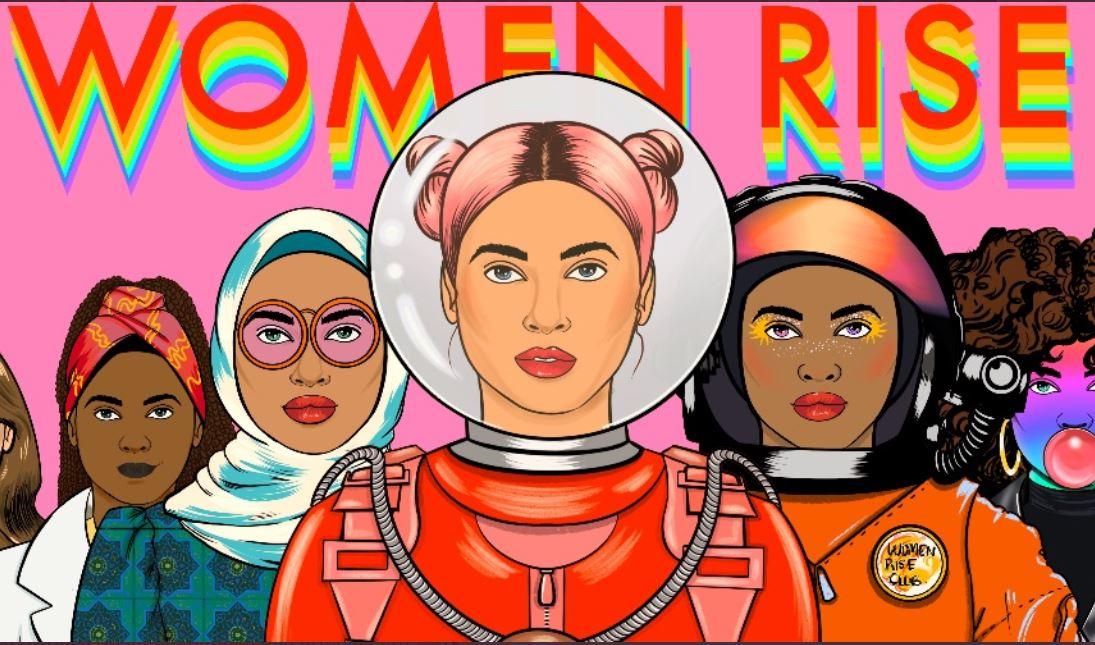
In nearly all fields in the world, Abidi said, there is a “gap when it comes to women of colour being able to access opportunities. And again, it has nothing to do with their intelligence or talent, because there’s no lack of that. It has to do with just the gap and the systemic barriers.”
Things are no different in the art and NFT space. This is why initiatives like the NFT residency are necessary to give women, especially women from underrepresented and marginalized communities, the opportunities they deserve. Nonetheless, the industry needs to do more to ensure diversity and inclusion in the space.
What the industry can do to ensure diversity
“It’s important for everyone in the space to be aware, educate themselves, and continue to have conversations,” said Fish. “Intentionally creating spaces that are for women and non-binary people is a really important first step toward increasing diversity and inclusion.”
That said, Voice also found that not everyone wanted to join a residency specifically for women. As a result, the platform currently has separate programs for artists from marginalized communities and for women.
“People can choose what kind of space they would like to be a part of,” Fish added. “I think that providing options is a really important step towards diversity and inclusion.”
While Abidi agreed with Fish, she believes it’s also important to provide opportunities for women already in the space. “If only 16% of women are getting the opportunity and only 5% of them are making money by selling their art, then the problem is not going to be solved. So, while we’re talking about increasing diversity and female representation, we also need to discuss how to increase opportunities for women who are already existing in the space.”
“I think that’s where the concept of equality and equity is very important for us to think about,” she added. “Programs like Voice residency, that are not really asking anything from the creators, and are all about giving back and making sure that they’re amplifying the creators, are so important.”
More often than not, creators who are new to the space are unaware of where to start, Abidi explained. Therefore, it is essential to recognise the “barriers” they are facing and then equip them with the resources they need. They should also get a “safe space” where they can be just artists. At the end of the day, “it’s all about accessibility.”
What to expect from the Voice x Women Rise residency program
The applications for the month-long Voice x Women Rise residency program is now live and will close on May 7. The residents will get a month to create their pieces, which Voice will drop throughout the summer. This time, the artists can create NFTs around the themes of equity and justice, identity, future-proof, and well-being.
“For this residency, we’re focused on a couple of themes we selected to be broad enough so that each artist didn’t feel confined to a specific theme, medium, or any kind of content that they felt forced to create,” Fish said. “It is open to their interpretation and their perspective. Also, they’re the most pertinent issues of our time.”
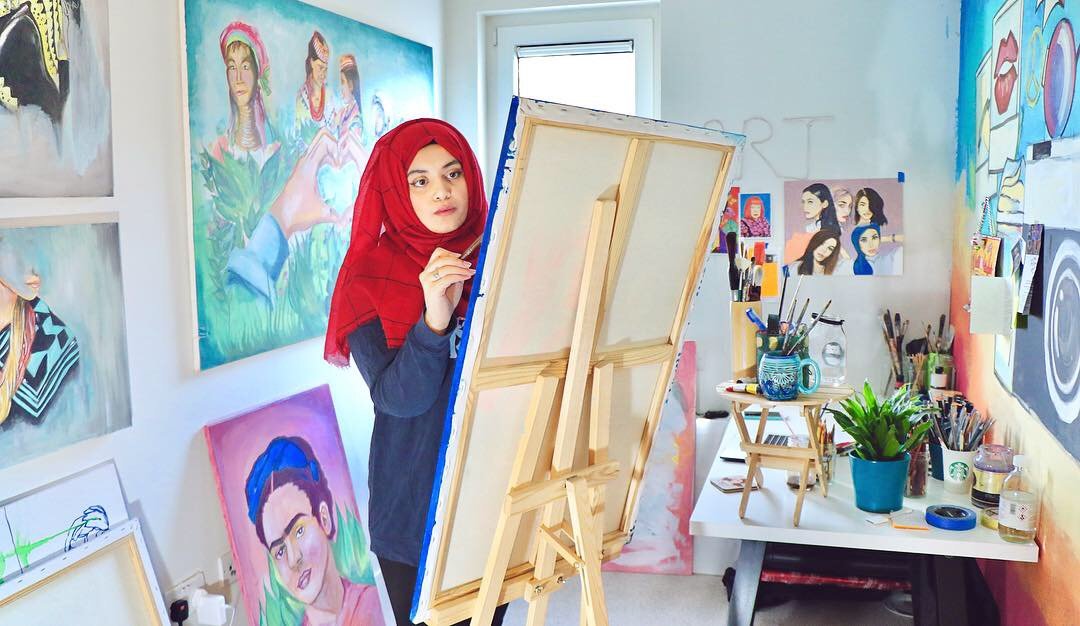
For the program, Voice is looking for digital creators who are either active on social media or are ready to engage in the same. Once selected, the residents will get a “small creation stipend”. They will also get to work with the Voice team and Abidi. In addition, the team will help the creators with a marketing plan. What’s more, all sales made within the first 30 days of the drop will get a sales bonus.
“It’s really a kind of all hands on deck residency from our side but it is also self-directed,” she added. “This really can be moulded to whatever each artist is looking for.”
An opportunity for artists to “push themselves”
At the end of the program, Fish hopes the creators will “push themselves” to go beyond their last project and “take some risks”. Echoing this, Abidi added that the residency is a great opportunity for the artists to focus on their creativity.
“In the NFT space, art is art. There is no limitation of mediums—it’s not just limited to paints and coloured pencils, or photography, or music. It’s everything,” she added.
“As a creator, you should recognize that potential and recognize that strength. It is almost like a superpower that you have. As a creator, you literally have the power to create and you can use any medium. And you can develop your skills. And I think artist residencies are a perfect place to do that.”
You can apply for the Voice x Women Rise NFT residency program on this website.
*Quotes are condensed and edited for clarity
All investment/financial opinions expressed by NFTevening.com are not recommendations.
This article is educational material.
As always, make your own research prior to making any kind of investment.


